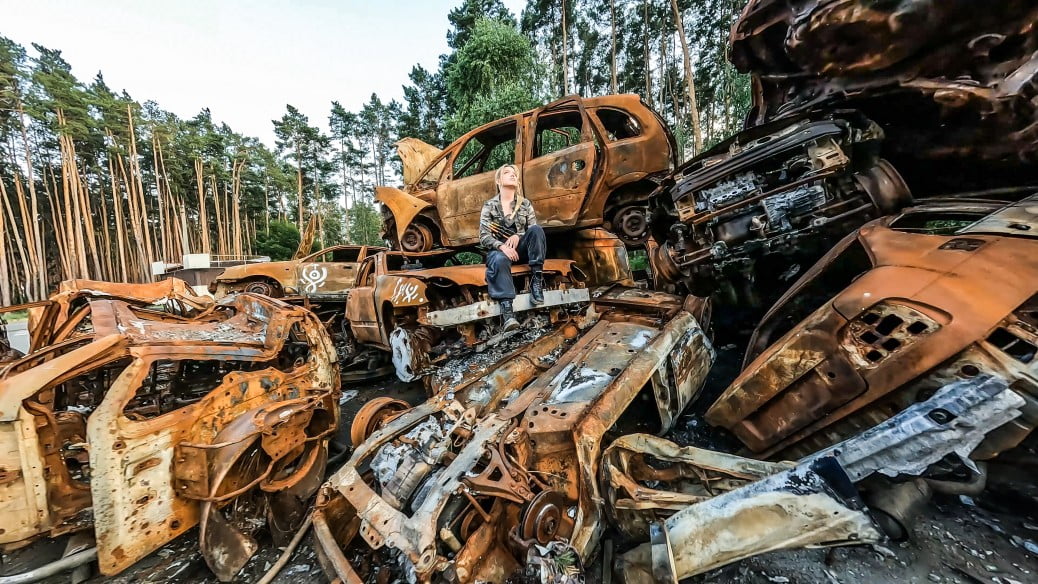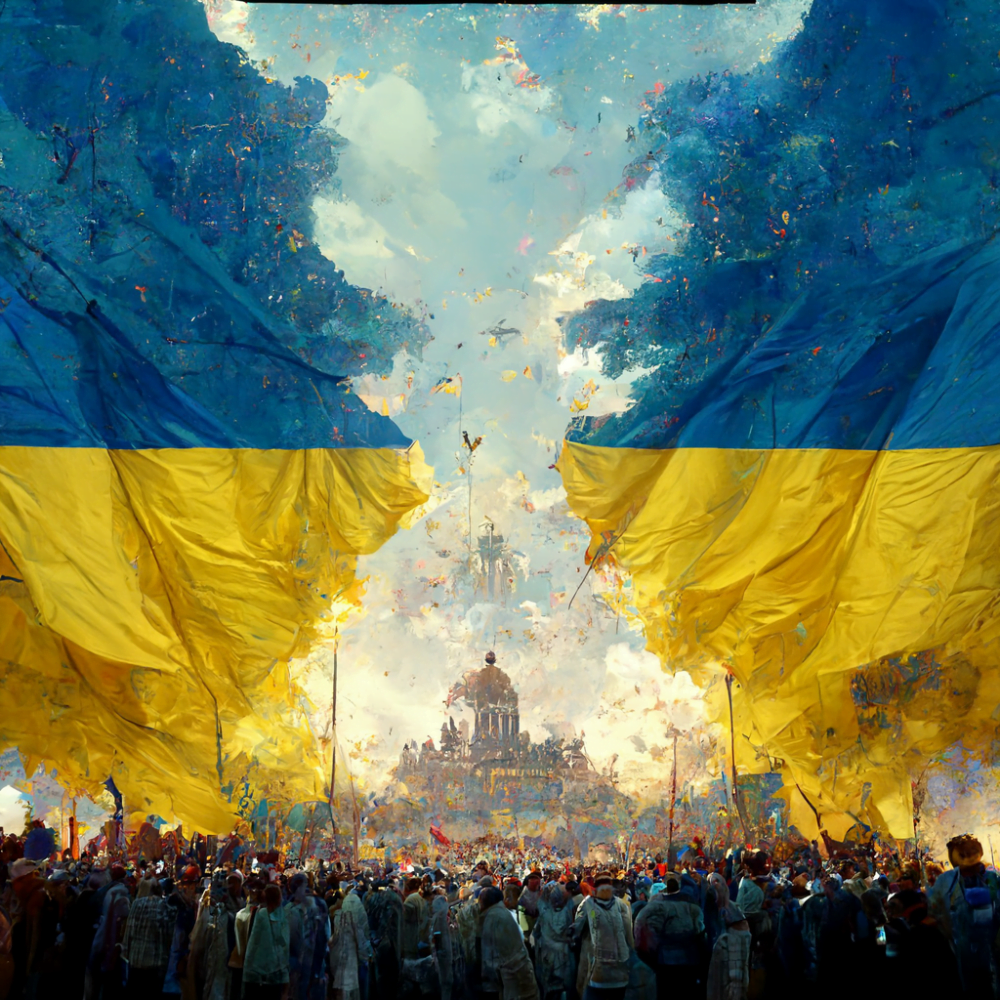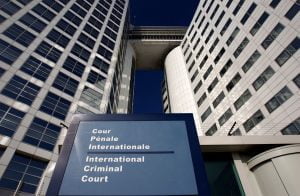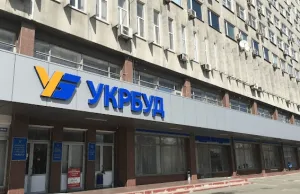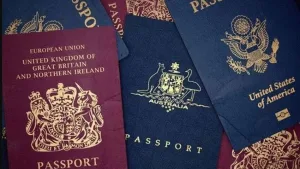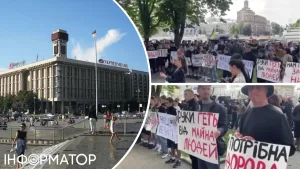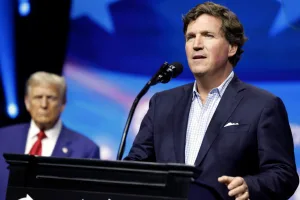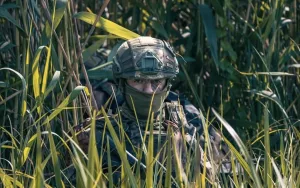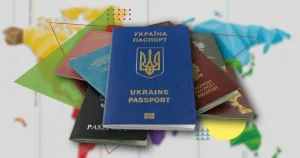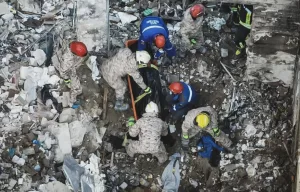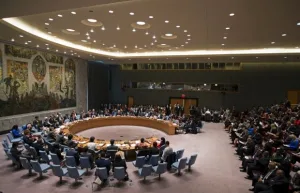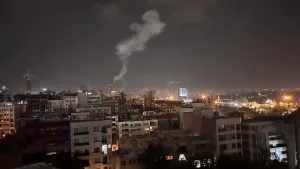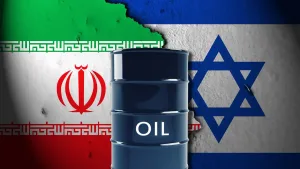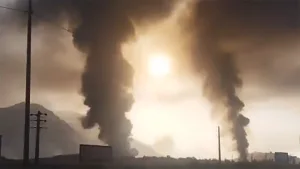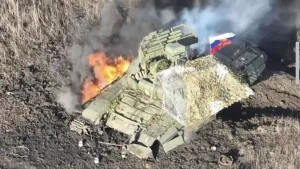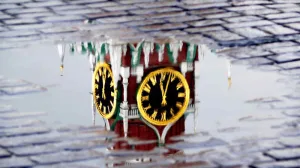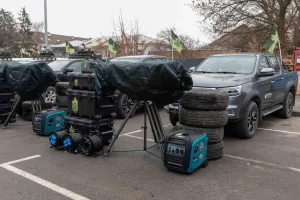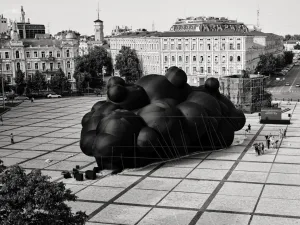Ukrainian – American singer Kelsie Kimberlin interviewed the Head of Defence Work Department of the Bucha District State Administration Danylo Burovin, who defended the region from the russian invasion back in 2022, and continue to protect the sky over the Kyiv region from russian air attack now.
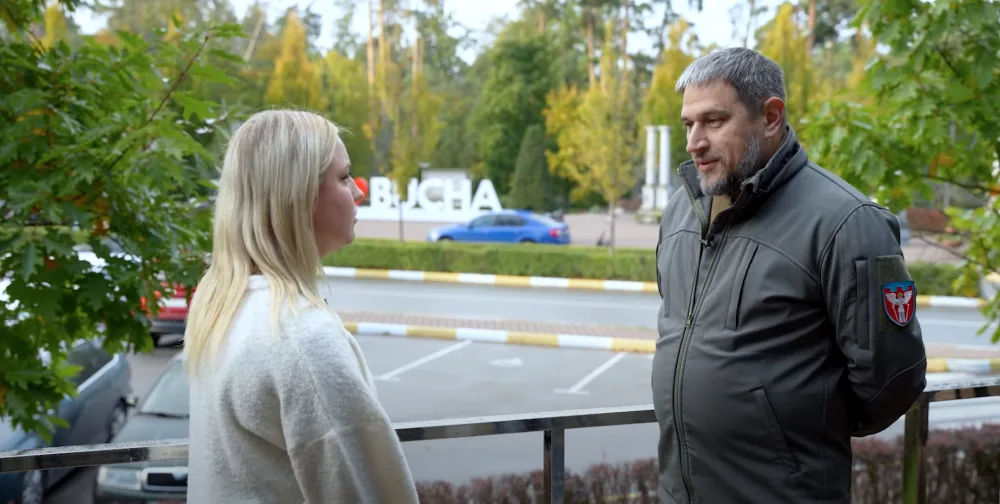
Kelsie Kimberlin: Hello.
Danylo Burovin: Hello.
Kelsie Kimberlin: Nice to meet you and thank you for meeting with me. So, I want to thank you for coming and talking to me today. And sharing stories with me and being open to doing this. One of my first questions for you and you’re welcome to answer what you feel comfortable answering and what you don’t feel comfortable answering. I was wondering, being a leader of soldiers and having to take care of others and make decisions all the time, how do you bear this responsibility and how do you work with their strength and helping everyone get through everything but also how do you deal with the responsibility of having to take care of others while you are out there as well as yourself?
Danylo Burovin: Well, to say that there is some kind of clear-cut decision — there really isn’t one. In the past, I was an athlete, a candidate for master of sports, and then a master of sports. So I was raised with the mindset that you have to stay in control, pull yourself together, and if there’s a task — you have to complete it. First and foremost — the task. Taking into account all possible risks and everything else, it still has to be done. Just like it was in sports — the same applies in life, and all of that came in handy when the war began.
We had missions, combat objectives. Of course, I was nervous and worried — but only on the inside. Outwardly, I didn’t show it. Because if I had lost my composure, my guys, my soldiers — they would’ve started to panic too, and that would’ve really affected how we carried out the mission. So, I simply couldn’t allow myself that. I had to get a grip on myself. How did I manage? At the time, I didn’t really understand. Even now, I’m not sure how I pulled it off. But somehow, I managed to gather myself — internally and externally — and we completed the mission. My guys were behind me, and I knew they were counting on me. I could see in their eyes that they were scared, they were afraid. But still, they were united, they stood together, and they looked at me. So if I had done something wrong or acted uncertainly, I know they would’ve panicked too. That’s why I couldn’t let that happen — because too much depended on it. Now, when I recall all that happened, it gives me chills. That’s probably why I’m not feeling so great emotionally right now. Please don’t mind that — it’s just that I’m going back to that time in my mind, to how things really were. Because, you know, I fought back in 2014, and then almost ten years passed until 2022. And of course, I was scared then too — but I already knew how to deal with it.
Kelsie Kimberlin: I want to say we’re able to pause or stop whenever you’d like and whenever you feel that you need to. And you know that you mentioned what you just said about flashbacks is, I was wondering is there anything being done right now for soldiers that are coming back with flashbacks or people that have been discharged for mental health? Is anybody helping soldiers with this problem in Ukraine right now?
Danylo Burovin: As far as I know, there aren’t any large-scale state programs for this. The government hasn’t reached that point yet. Right now, we’re just trying to hold the front line, so when it comes to treatment — both for military personnel and civilians — we’re still very far behind. Civilians are suffering even more than the military, because at least the military is somewhat prepared for this. Civilians aren’t prepared at all. No one is really dealing with this issue.
I do know there are some foundations and NGOs trying to work on it — helping with rehabilitation and social reintegration of soldiers who have returned, those who are wounded, or who have been discharged either due to physical injuries or psychological conditions. Some organizations are involved in this, but it’s not done on a professional level. It’s more on the level of human kindness, let’s say — an effort to show these guys they’re not forgotten, that someone cares, that someone is trying to help. As much as it’s possible — both financially and physically — people try to support them.
I have a fellow soldier who runs a charitable organization. They help wounded soldiers who are already in rehabilitation or receiving treatment. These men are in hospitals here in Kyiv and the Kyiv region. They take those who are able to travel — even guys in wheelchairs or on crutches — and bring them out for simple things like fishing trips. They relax, sing songs, talk — just to let them feel that they’re not alone, not abandoned.
I believe this kind of social reintegration for returning soldiers is incredibly important. Because some of these men have lost limbs — they fall into despair, they lose hope, they think life is over. And we’re talking about young men, 30–35 years old. We try to support them however we can.
Of course, we’d like this to happen at the state level. But at the same time, I understand that the state just doesn’t have the resources — either financial or otherwise — to do this on a larger scale right now. Right now, the focus is on holding the borders, holding the front line. And after that — we’ll begin to rebuild.
Kelsie Kimberlin: I hope that follows afterwards, when we win this war.
Danylo Burovin: We truly, truly hope — because once again, there aren’t that many of us Ukrainians, and we’ve already lost so many people on the front lines. We don’t want to keep losing those who can help rebuild. The men who defended Ukraine’s independence and freedom — who took part directly in the fighting — they are the ones who truly deserve to live in our country, in the country we’re fighting for: free, independent, and strong. They deserve to live.
Not those who ran away, who just wear embroidered shirts and hide somewhere in the West, loudly proclaiming that they’re true Ukrainians and patriots. No — it’s the men who stood their ground and fought who are worthy. And they will live. I believe we must do everything possible to help them become a part of society again, no matter the psychological or physical wounds they carry. They must be able to live, to move forward, to raise children — because that’s also incredibly important. As I said, there aren’t that many of us Ukrainians left. We want Ukraine to have a future.
Kelsie Kimberlin: And to do this we need to have programs afterwards to be able to get there and it is very important.
What do you think keeps Ukrainians fighting, keeps their strengths, their resilience? What do you think motivates them to keep fighting no matter what for their country? What do you think makes people fight for their country every single day even after all these years of fighting and they keep fighting and people keep coming in? What makes them stay strong to keep going and believing in the future and not giving up?
Danylo Burovin: I believe that above all, it’s about hope. A person lives as long as they have hope. Hope is everything. As long as someone has hope, they can feel, make plans, and dream. That’s why I believe that all our people who have stood up to defend our country are hoping that the future will be better, that we will endure, and that we will win.
Because we are fighting for our independence on many fronts. Of course, the frontline is the most direct one. But we also have the rear — and without the rear, there is no frontline. People who are working in the rear, those who didn’t flee — and I want to emphasize that again — are contributing in many different ways, working directly to support our military and to maintain civil life.
I especially want to mention those people who keep our daily life running: energy workers, food suppliers — those who enable us to keep fighting. They are an integral part of our resistance. And so, thanks to all these people who still believe and still hope, we are confident that after our victory, Ukraine will have a happy future — a future better than what we had before.
This war has become a turning point. As the saying goes, “hard times reveal true friends.” And that’s exactly what has happened. Those we once thought of as friends or allies either fled or, frankly, betrayed us. Meanwhile, people we never expected to rely on stood by our side, shoulder to shoulder — and now, together, we are building Ukraine’s future.
That’s why I believe we are driven above all by faith in the future — and we are moving toward it. I’m sure of it. There’s no other way. It’s do or die. And so it will be.
Kelsie Kimberlin: I think that was a beautiful response and a good way to put it about hope. And you know, I want to say to, I guess, maybe our audience that’s watching, that a lot of them don’t know that the war hasn’t just been going on for two years. The full-scale war has been going on for two years.
But what most people don’t know is that this war has been happening since 2014. Some — even before, if they know the Ukrainian history. It’s been going on for almost 200 years.
And we’ve been always fighting and keeping our country. And that’s who we are and who you are.
So I just want to point that out — that you’ve been fighting since 2014 and, you know, keeping the hope and keeping it going. And I think that’s important — that people know that people have not just been fighting for the last two years. It’s been going on for longer than that.
Except for the full-scale war. But in America, they think it’s been going for two years. So I just want to point that out to our American crowds — it’s been going a lot longer than everyone knows.
And you’ve been there since the beginning.
Danylo Burovin: I’d even go further — we’ve been fighting Russia our entire lives, on many different fronts. And that includes the information front, because the Russians have always tried to erase our history. So many discoveries have been made that prove the existence and heritage of Ukraine — and the Russians have taken them from us, hidden them away, and still keep them out of reach.
We didn’t even know our own history. And now, as all these facts begin to come to light, we realize that we’ve been fighting all our lives — throughout the entire period of Ukraine’s independence, we’ve been in a constant struggle. And even before that, for many, many centuries, we’ve been fighting for this.
They try to steal our history and make it theirs. They try to claim all the achievements that belong to Ukraine. That’s why this fight has lasted for centuries — and we’ve been resisting on every front.
Kelsie Kimberlin: Yes. And I thought that was important for a lot of people that I guess don’t realise that, you know. I was wondering, when you think and look at other soldiers, what impresses you most about soldiers and people fighting right now? You have already told me that they have a hope of the future but what do you think gives them hope as well?
Danylo Burovin: I think that young guys are more emotional; they are driven more by the heart. Older people — they’re already driven by the mind. That’s why young guys know that this is ours and they defend it. And the older ones, they tend to think things through first. They think about how to defend. I had fighters who were extremely emotional about all of this — they, as they say, were ready to tear off their bulletproof vests and rush forward, fast, fast, fast. But I tried to hold them back, because I had experience and I knew that’s not the way to go. I understood the whole situation with my head. They — with their hearts. I — with my head.
So there’s always this young force, emotion, and drive, and then there’s life experience, military experience — and together, that allows us to endure. It’s the strength and drive of the young and the experience of the older fighters who know what to do and how to do it. They complement each other. Because again, if you have experience but no capability, your experience is useless. And vice versa — if you have capability but no experience, you can’t operate the way you should.
Of course, they complement and complete each other. That’s why we hold the line.
Kelsie Kimberlin: You’ve been through a lot of difficult moments on the frontline. And I was wondering, what do you do to keep yourself in shape? Not just physically, but in your mind. How do you keep yourself sane?
You know, when you came in here today and I first met you, before the cameras, you were smiling and happy. You were laughing with me. I’m just wondering, how do you keep this happiness inside of you after you’ve seen all these difficult things and been through so much?
How are you keeping yourself so composed and in the best way possible?
Danylo Burovin: Again, it’s hope, it’s dreams — we hope and dream. Again, it’s family, it’s a wife, it’s hobbies. These things give me strength. Walks, tourism — sometimes they help me disconnect from some difficult situations, from military situations, and, as they say, give me a bit of a reset. And this reset provides an opportunity for new moves, for new actions. Sometimes, a situation arises that you don’t know how to solve because it seems like a dead end. But then, as it happened last year, we went for just three days, only three days, because I can’t allow myself to rest for long while the guys are in the trenches. We went to the Carpathians, and it was there that the idea came to me on how to solve that difficult issue, and it was solved. So sometimes you need to reset, think about the future, dream about the future, plan for the future, and that’s when it gives you the opportunity to live in the present, exactly like that.
Kelsie Kimberlin: I think that’s how everyone feels, you know. I am the same way — taking walks, finding a hobby, mountains. I love mountains.
And also you are saying you won’t take a vacation while you have your other men in trenches. That is another thing I’m just shocked about hearing from you. It is just like a lot of people aren’t like you, a lot of people don’t think that way. And so, just great.
Danylo Burovin: Exactly. I believe it can’t be any other way. As long as we have an enemy, we must work. Work in all directions. And only after victory, after our victory, will we celebrate, rest, and begin restoring and building the future.
Kelsie Kimberlin: How would you define a victory for Ukraine? Is it winning the war, having freedom, restoring Ukraine? And with Ukraine having a victory, what is your definition of victory for Ukraine? But also how is Ukraine lacking right now to have a victory, would you say? If there is any.
Danylo Burovin: It’s a difficult question. At the same time, it’s very large, very broad, and yet understandable. We are Ukrainians, we are not warriors, but when needed, we can take up arms and defend our family and our land. I believe that victory for Ukraine means that we can live on our land, raise our children, and plan and build the future. And for this, no enemy should interfere with us. That will be our victory: no one influencing our thoughts, and we can freely express what we think. People should listen to us if we are right. If we are wrong, of course, they should guide us on how to do things better. But our opinion, for us and for the world, should be clear: if we say these lands are ours, we will not give them up, then other solutions must be found to ensure that these lands, I mean the eastern part of our state, remain with us. Because I hear, and hear a lot, that some Western partners are trying to push us towards compromising, to give up these lands for the sake of peace. No, I believe that’s wrong and it should not be this way. So, we Ukrainians will stand firm.
If you simply ask people what they think should be done, whether we should stop the war at the current stage and perhaps move on, I believe the majority will say that we must continue until victory and free all our lands that were recognized in 1991, and restore our state to the way it was before the full-scale invasion and before 2014. Because it’s especially hard for me to hear when they say we must give in because it’s for the best. How can Western or other partners say that it’s for the best? What’s better? Listen to our opinion, listen to what we think, and then maybe draw general conclusions. And maybe guide solutions but not make decisions for us. We don’t want anyone to decide for us. We want to express our own opinion. It’s like when you tell a child, “Do this, do that, do this,” but they still do things their own way until they hit their head. That’s how we are. Maybe we don’t know everything, maybe we don’t have all the skills, but we listen to the advice of those with more experience. But we have our own opinion, we have our own solution, and we believe it’s right. If it needs some adjustments, then fine, let it be. Let them listen to us.
Because Ukraine is a large country, a strong country in spirit, in scale, and in scientific achievements, in research — we are powerful, and we will manage everything as long as we overcome the enemy. If we make concessions or compromises, it will be a betrayal of those who have already died, those who have lost their families, those who have lost their health. That’s why I believe we should not enter into any agreements, negotiations, or deals with the enemy, because that would be a betrayal to our guys.
Kelsie Kimberlin: So there is not a direct translation of “volya” in English, but I was wondering how would you describe the meaning of this word? And especially with the war happening, has this word changed over time in the meaning for you and the perspective of this word? And if you could tell me what “volya” means in your best ability, even there is not direct translation. How would you describe it to me? And to everyone else.
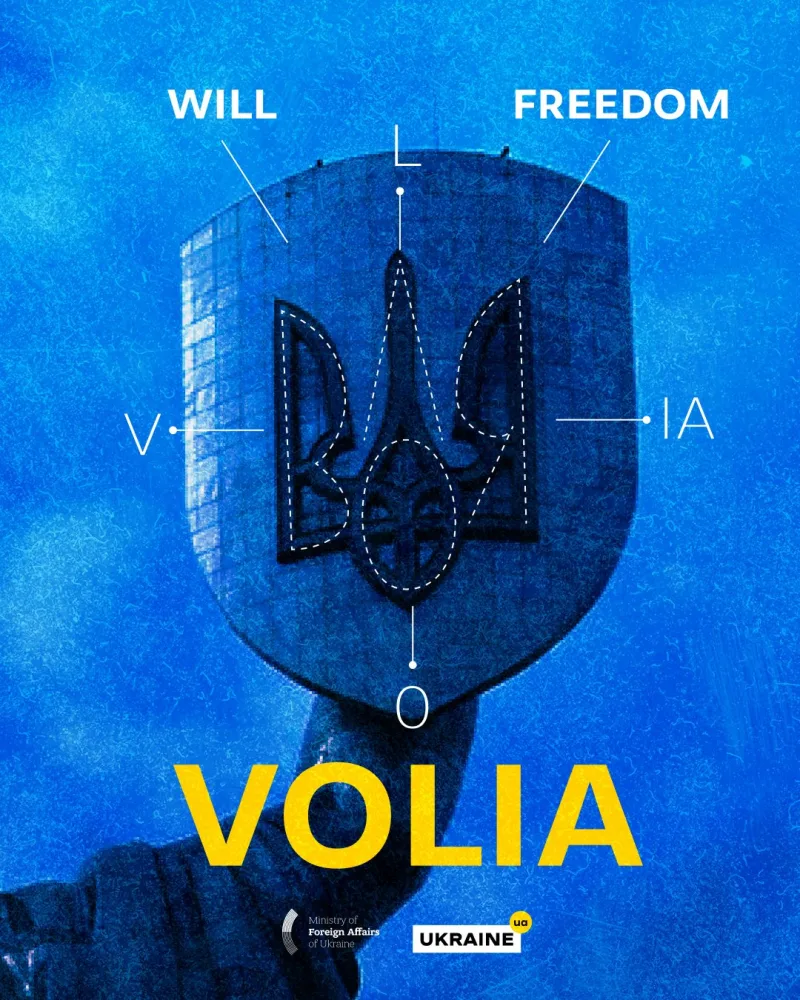
Danylo Burovin: It’s hard to explain because it’s something deep in the soul, deep in the heart. What is volya? Well, if it can be translated, it’s the desire for something in the future, something with prospects, something like that — the thirst for freedom, resilience, and for the future. It’s hard, very hard to translate, but it’s maybe even dreams about something beautiful in the future. That’s volya, well, I can’t even say how to translate it. It’s volya — it’s the thirst for something wonderful in the future. So, it’s the will for the future, if I can put it that way.
Kelsie Kimberlin: That’s a great word. And I’m trying to think of what the English equivalent word it would be and I just don’t think we have one but we should.
Danylo Burovin: Yes, yes. Well, I believe there might be some kind of conditional translation, but with all its strength and context, I think there’s no equivalent. It doesn’t exist in other languages. It doesn’t, because it’s ours, Ukrainian. Again, it’s our authentic — volya.
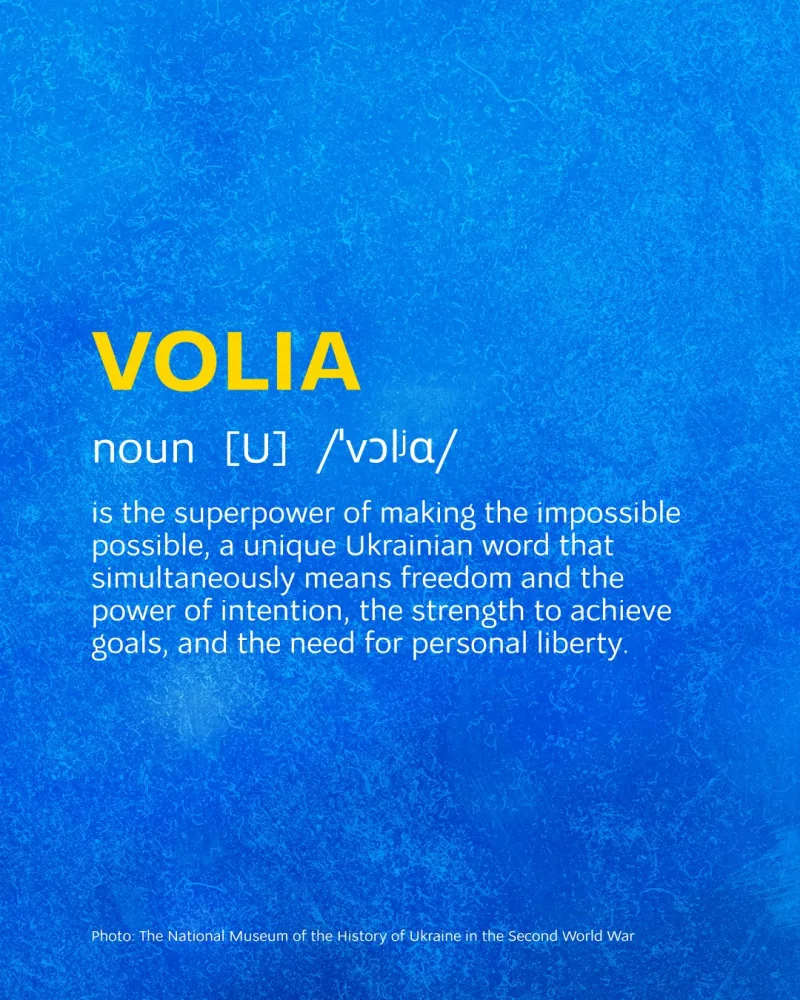
Kelsie Kimberlin: So I know we were talking about a lot of things and you told me stories about you fighting in Bucha, where we are currently. And you told me that story about coming upon torture chamber at a cildren’s camp. And I know it is a very difficult story to probably tell and I was wondering if you would tell it again? Maybe for everyone else to hear as well. If you are willing.
Danylo Burovin: It’s very terrifying to remember this; you always try to forget it, because those are such horrible images, of course. You can never get used to them. If they say that soldiers get used to this, no, it’s impossible to get used to this. Soldiers just try to hide it within themselves. It was very, very scary. Of course, first, special services entered those premises, filmed everything they found there. They checked first to make sure there were no traps, no mines, and so on. Then they went in and filmed exactly what happened there. There were human remains. A lot of them. There were inscriptions on the walls, patriotic ones. I believe the people who were there tried to leave some kind of memory behind because they understood they wouldn’t leave there alive. And there were names, surnames, and streets they were from, to mark themselves somehow. It was terrifying, terrifying, there was a lot of blood, it was very frightening. They used many things for torture. In the modern world, I just don’t understand how this could happen. It’s just inhuman. A person cannot go that far. A healthy person cannot behave like that. Especially when soldiers fight against soldiers, that’s something you can maybe understand in some way. But when soldiers torture civilians, specifically torture them — experts even said there were children there. I personally didn’t see it, I don’t know for sure. But the experts said there were children, women, men. I can’t even imagine what would have pushed them to do this. What should a person do to be tortured like that? I don’t know. That’s why it was very terrifying.
Of course, not everyone was allowed in, only those directly involved in the work. Even not all soldiers went in. It couldn’t be done just like that, it was very, very terrifying. It’s hard to remember.
Kelsie Kimberlin: Thank you for resharing that story with me. You know, I didn’t experience it and you did. And I’m over here the one crying. So I appreciate it and I can’t imagine that. But I think it’s important for people to hear these stories and hear what Russia is doing to innocent civilians. It’s not just soldiers, it’s civilians too. And what they’re capable and how sick they are. And what they’re doing. And that they can do it to children too. They’re doing it to dogs and cats. And I think it’s important because we have so many medias in the United States thats covering what’s going on here in the war. But we’re also having, sometimes Russian propaganda comes into our media. And I think it’s important to be hearing these stories and what these people are actually doing to you guys. And what you’ve seen and I think these stories need to be told. So thank you for sharing it. And it’s also, people that can do that are not normal people. And I don’t know if you guys have a word for it here, but we call those psychopaths. And I think we lack knowing these stories too as well. And you know another thing about it is like Ukraine right now is protecting everyone to the free world making everyone else free. It’s one thing that I need Americans to understand is you guys are fighting our war as well. If Ukraine doesn’t win, what’s going to happen? World War 3. That’s why we need to support and send our money over. Help as many times we can because you guys are protecting the rest of us. And a lot of people are not understanding that. I guess. So, my message is I’’m trying to get people to understand.
Danylo Burovin: Yes, absolutely. We are very grateful for your support. We thank the American people. We thank the European countries that are supporting us. We also believe that we are holding back this aggression, first and foremost thanks to your help, because our will alone would not be enough — financial aid and weapons, that is exactly what we need. And I also believe that we are restraining this aggression and not allowing Russia to feel like they can do anything. They can’t — because all of us together must stop this.
I believe the idea that Russia is all-powerful and capable of anything is a myth. No — if we all unite, with weapons and financial resources, then of course we will overcome all of this. And Ukraine will be able to protect both America and Europe — simply because we are the ones currently facing this enemy, and we are, as they say, breaking its teeth so that it will never again be able to raise its head.
Thank you for your support.
Kelsie Kimberlin: Thank you. And I wanted to ask you if you have anything else you want to say to everyone else or any stories you want to share or anything you just want to, get out there, you are allowed to say anything. No filter.
Danylo Burovin: Well, I would like to say something that everyone should understand — we do not want war. We are forced to defend ourselves because the enemy came to our land, and that is why we are asking for help to protect our homeland, our families, our homes. It’s important to understand that the enemy standing at our borders, already on our soil, is not invincible. He can be defeated, he can be overcome.
But some time ago, we were stripped of the weapons with which we could have fought back. And we believed — we believed Russia, and we believed the global community. We believed that in a time of crisis, they would help us. And yes, we are receiving help now, but it’s coming far too slowly — painfully slowly. And we are losing — I mean, we Ukrainians — we are losing people. Civilians. Soldiers.
And by the time the weapons finally reach us — the weapons we need to defend ourselves, I want to emphasize — there may be no one left to take them up. That’s why I’m simply appealing to you: give us the means to protect ourselves and to protect peace from this Russian onslaught. Because they — they are not human. They are not human.
If we first and foremost have the weapons for defense, we must use them to protect civilians. Of course, in all wars, soldiers fight. But when civilians suffer — we, as soldiers, begin to lose our very purpose. Because when we return, we don’t recognize what used to be here. The civilians are gone, the entire infrastructure is destroyed — the energy system, factories, everything.
So we are asking: let us defend our rear, our families, our homes. Just give us that chance. And we will protect you. Because the Ukrainian army is one with real combat experience. We’ve had it since 2014 — it’s been 10 years now. We know how to fight, and how to fight such… I don’t even know the right word… such an enemy.
Russia is not a simple adversary. They are extremely treacherous — that’s the right word — treacherous. But we know how to fight them. Just give us the chance. Give us the means. And we will do it.
Follow the link to watch the full interview.

